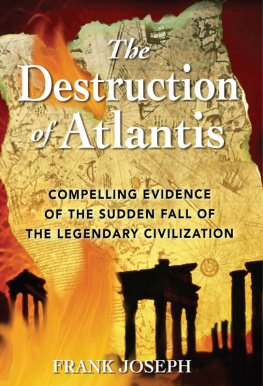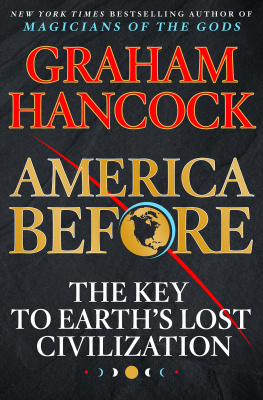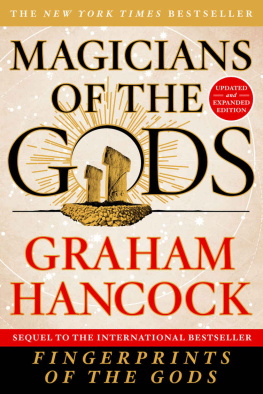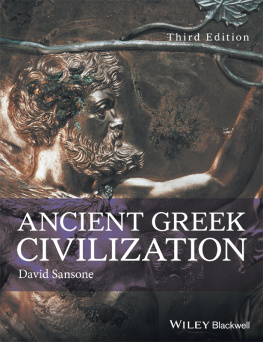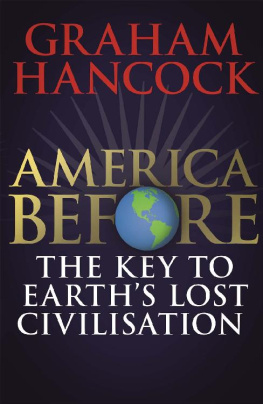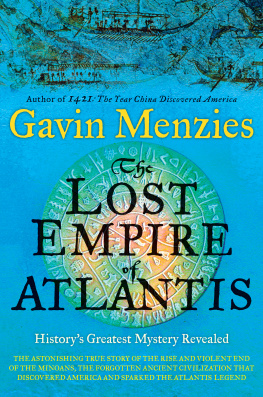T HE L OST C IVILIZATION E NIGMA
THE LOST
CIVILIZATION
ENIGMA
A N EW I NQUIRY I NTO THE
E XISTENCE OF A NCIENT C ITIES , C ULTURES,
AND P EOPLES W HO P RE -D ATE
R ECORDED H ISTORY
P HILIP C OPPENS
best-selling author of
The Ancient Alien Question

Copyright 2013 by Philip Coppens
All rights reserved under the Pan-American and International Copyright Conventions. This book may not be reproduced, in whole or in part, in any form or by any means electronic or mechanical, including photocopying, recording, or by any information storage and retrieval system now known or hereafter invented, without written permission from the publisher, The Career Press.
T HE L OST C IVILIZATION E NIGMA
E DITED BY J ODI B RANDON
T YPESET BY E ILEEN M UNSON
Cover design by Howard Grossman/12E Design
Printed in the U.S.A.
To order this title, please call toll-free 1-800-CAREER-1 (NJ and Canada: 201-848-0310) to order using VISA or MasterCard, or for further information on books from Career Press.

The Career Press, Inc.
220 West Parkway, Unit 12
Pompton Plains, NJ 07444
www.careerpress.com
www.newpagebooks.com
Library of Congress Cataloging-in-Publication Data
Coppens, Philip.
The lost civilization enigma : a new inquiry into the existence of ancient cities, cultures, and peoples who pre-date recorded history / by Philip Coppens.
p. cm.
Includes bibliographical references (p. ) and index.
ISBN 978-1-60163-232-6 -- ISBN 978-1-60163-582-2 (ebook) 1. Lost continents. 2. Geographical myths. 3. Civilization, Ancient. I. Title.
GN751.C66 2013
001.94--dc23
2012023292
A CKNOWLEDGMENTS
When I was 10 years old, my history professor told us to do a small project on an Egyptian monument of our choice. I chose the Great Pyramid. I do not remember the grade I gotthough it was good. I enjoyed Egypt so much that, for my own entertainment, I made the same report on the other two pyramids of the Giza Plateau. More than a decade later, I was asked to promote Marcel Mestdaghs studies on the Megalithic Civilization and make it available to a foreignthat is, non-Dutchaudience. I dont know when this seed was planted, but it was growing by the age of 10 and, in 1994, had reached maturity. Ever since, I have walked this path with the help of others, whom I have to thank.
Early on, in Belgium, the likes of Patrick Bernauw and especially Arnold Eloy were instrumental on my voyage of discovery. Since 1995, I have been helped by Herman Hegge, when together we created Frontier Sciences Foundation.
In my circle of friends, I would like to specifically thank: Theresa Byrne; Mary Parent; Patrick Ruffino; Paige Tucker; Jason Gossman; Sarah Symons; Marc Borms; Chris Norman; Duncan Roads; Cris Winter; Gerard Lohan; Eileen, Cathy, and Janeth Hall; Debbie Nicastro; Dawn Molkenbur; Stan Zaidinski; Fausto Callegarini; Tobi and Gerda Dobler; Marianne Wilson; Cynthia James and Carl Studna; JoAnn Parks and MAX; Peter van Deursen and Anneke Koremans; Isobel Denham; Duncan and Linda Lunan; Laura Marini; Kelly Cole; Wendy Vincent and Peter Shoesmith; and Susan Marek. Apart from being the best friends anyone could desire, you make life beautiful. By default, I will have forgotten some, and I sincerely apologize for that!
I thank the research and devotion of the following authors and often friends: Robert Bauval; Graham Hancock; Greg Taylor; Wim Zitman and Hendrine; Hugh Newman; Sam Osmanagic and Sabina; Florence and Kenneth Wood; Robert and Olivia Temple; Howard Crowhurst; Hugh Newman; Andy Collins; David Hatcher Childress and Jennifer; Michael Cremo; Gary Evans; Ralph Ellis; John Ritchie; Gavin Menziens; Alice Gerard; and Marcus Allen.
This book would not have come about without the vision of Michael Pye at New Page Books. You and the team at New Page do formidable work, mostly behind the scenes, in delivering new and exciting information to the world.
I would like to thank the thousands of Facebook friends and followers, who allow me to have a great virtual banter on a daily basis! I would like to thank Nespresso, for allowing me to make delightful coffee in the morning, which is a true miracle when writing.
Each and every member of the Coppens, Sonck, Harkey, and Smith family, though I need to specifically mention my parents, my brother, Tom, and his wife, Kathleen, and my nephews, Daan and Arne, Papa and Mama, as well as Patrick, Conor, and Shane.
Finally, I thank Kathleen. Without her, I am no one. With her, I can do everything. A few weeks ago, we created a special drinkblanquette, a type of sparkling wine from the South of France, to which we added a caramel liqueurand now, I toast this very drink to you, celebrating the completion of this book. Semper.
North Berwick,
April 12, 2012
C ONTENTS
Chapter 1:
The New Inquisition
Chapter 2:
Lost Civilizations of the Old World
Chapter 3:
Lost Civilizations of the New World
Chapter 4:
The Big A: Atlantis
Chapter 5:
Prehistoric Genius
Chapter 6:
Earth, Several Tens of Thousands Years BC
Chapter 7:
Creating Heaven on Earth
Appendix:
A World of Lost Civilizations
I NTRODUCTION
Is history as the history books teach us? Or is civilizationwhen humanity began to cultivate plants, work metals, build monuments, and live in organized settlementsfar more complex and older than we assume? As a 10-year-old child in school, my teacher taught that Greece was the cradle of civilization, even though in 1981, it was obvious that this was no longer the case: Egypt and Sumer were known to be far older civilizations, but somehow the textbooks used in Belgian schools had not caught up with facts.
Thirty years later, the situation has somewhat changed, but the criticism leveled at textbook historians remains: There reigns a paradigm that even though we no longer believe that God created the world in 4004 BC , we still assume that civilization could not possibly have existed previously. Before 4000 BC , it is widely assumed, our ancestors were pretty much savages. That is simply not the case.
The latest archaeological findings have pushed the boundaries of civilization much further back, to 10,000 BC , with sites such as Jericho and, most recently, Gbekli Tepe in Turkey. The existence of Jericho and atal Hyk has been known for decades, and has been dated to 8,000 BC , but I challenge you to open your childs schoolbooks, or any popular book on archaeology, and find a reference to these cities in there. The few archaeological publications that do, treat these sites as stand-alone pockets of civilization, even though they are all situated within hundreds of miles of each other. The obvious answer seems to be that they were part of one culture, but no such argument is explored by scientists.
When it comes to truly lost civilizations, such as the lost civilization of Atlantis, historians even ridicule anyone considering making a scientific study of it. They argue that Plato created an idealized society, rather than report a historical account, for the historians know there was no such civilization in existence in 10,000 BC . It simply cannot be. What they fail to report is that Plato wrote about Atlantis in a book solely devoted to history, and that when skeptics in his own time went to Egypt to discredit him, they instead returned with verification that Egyptian columns indeed contained the story of Atlantis, as Plato had reported. It shows, at the very least, that the ancient Egyptians believed in a lost civilization of Atlantis. In short, it shows that the theory cherished by historians is simply wrong.
Next page

